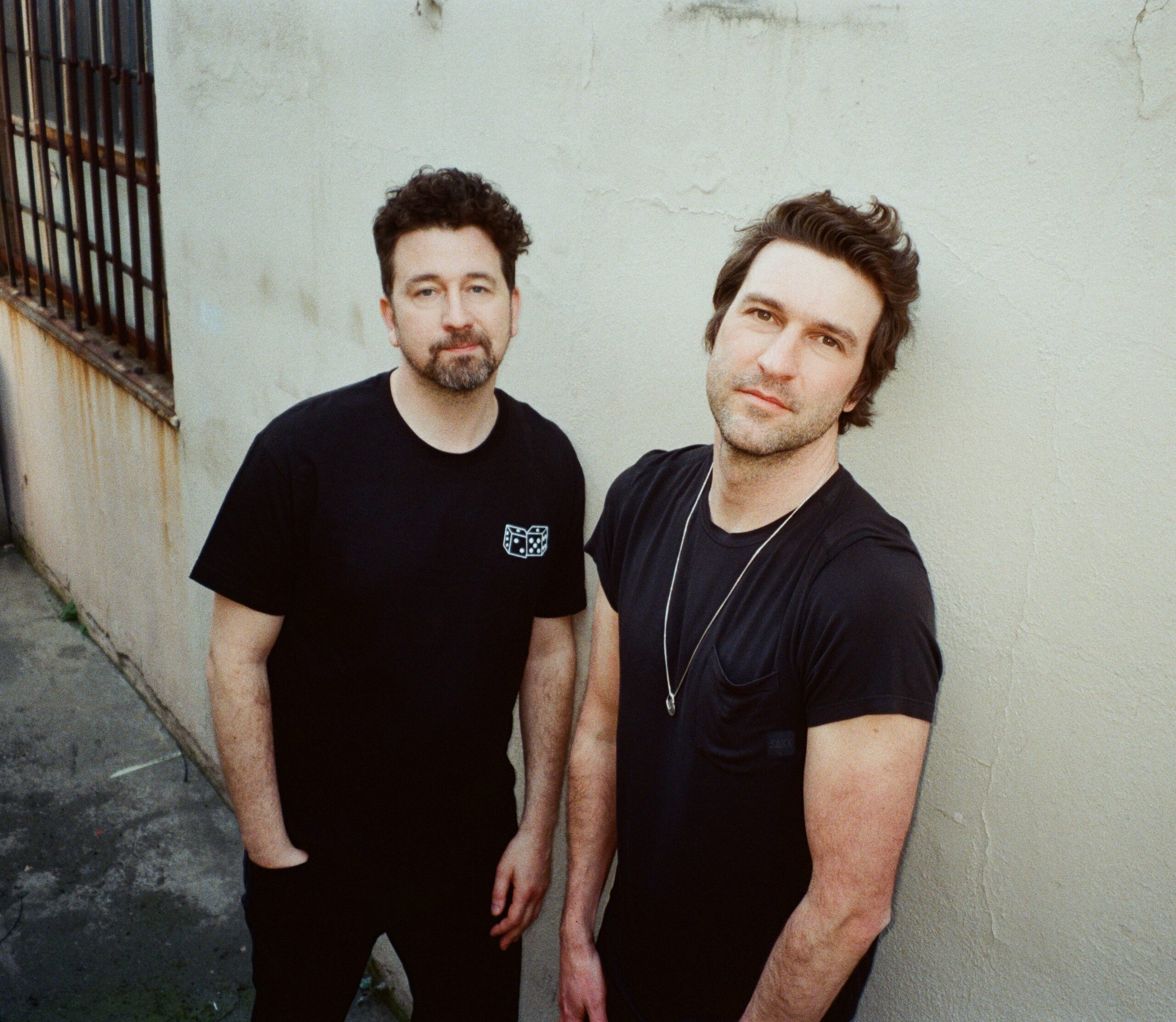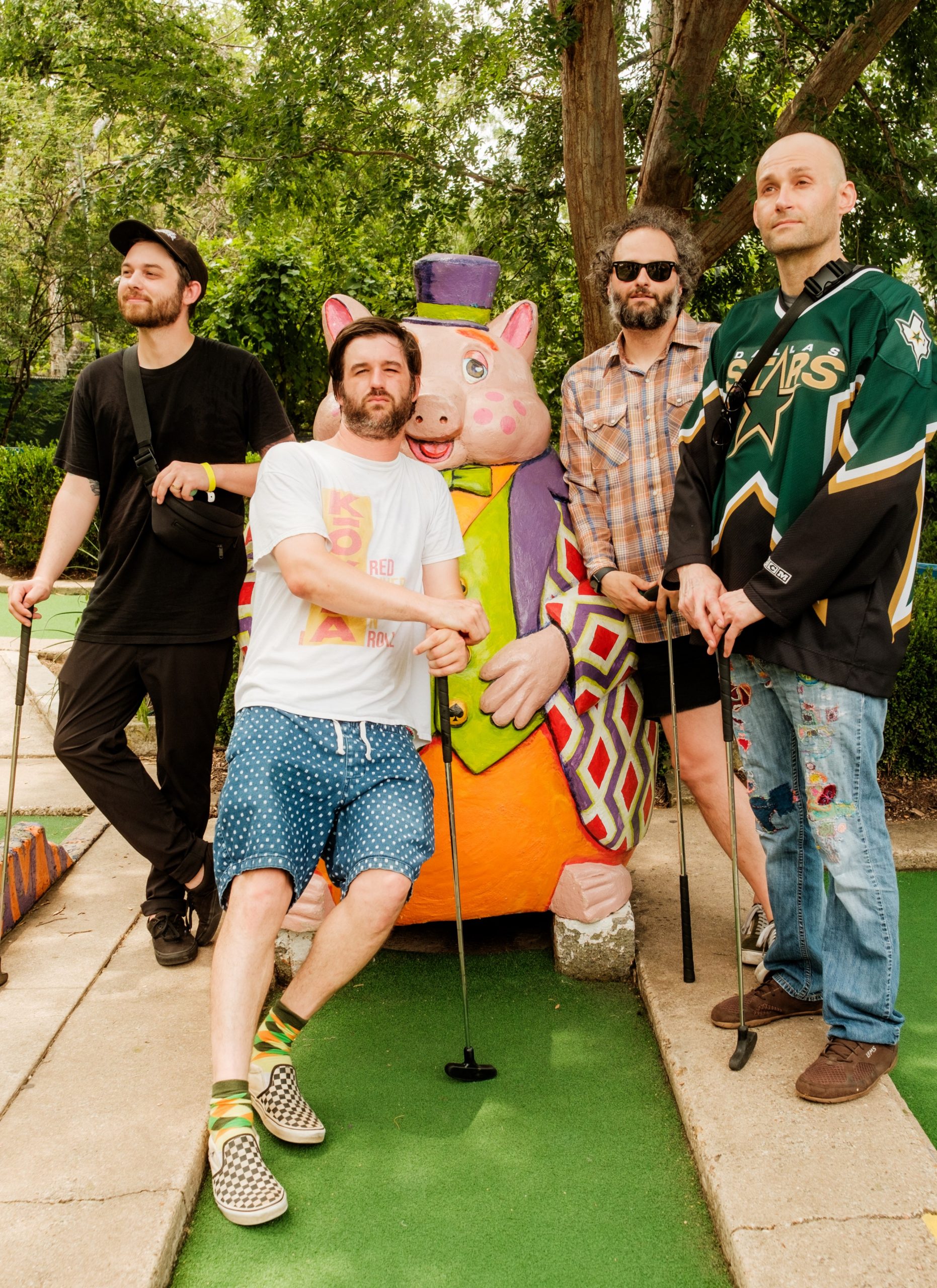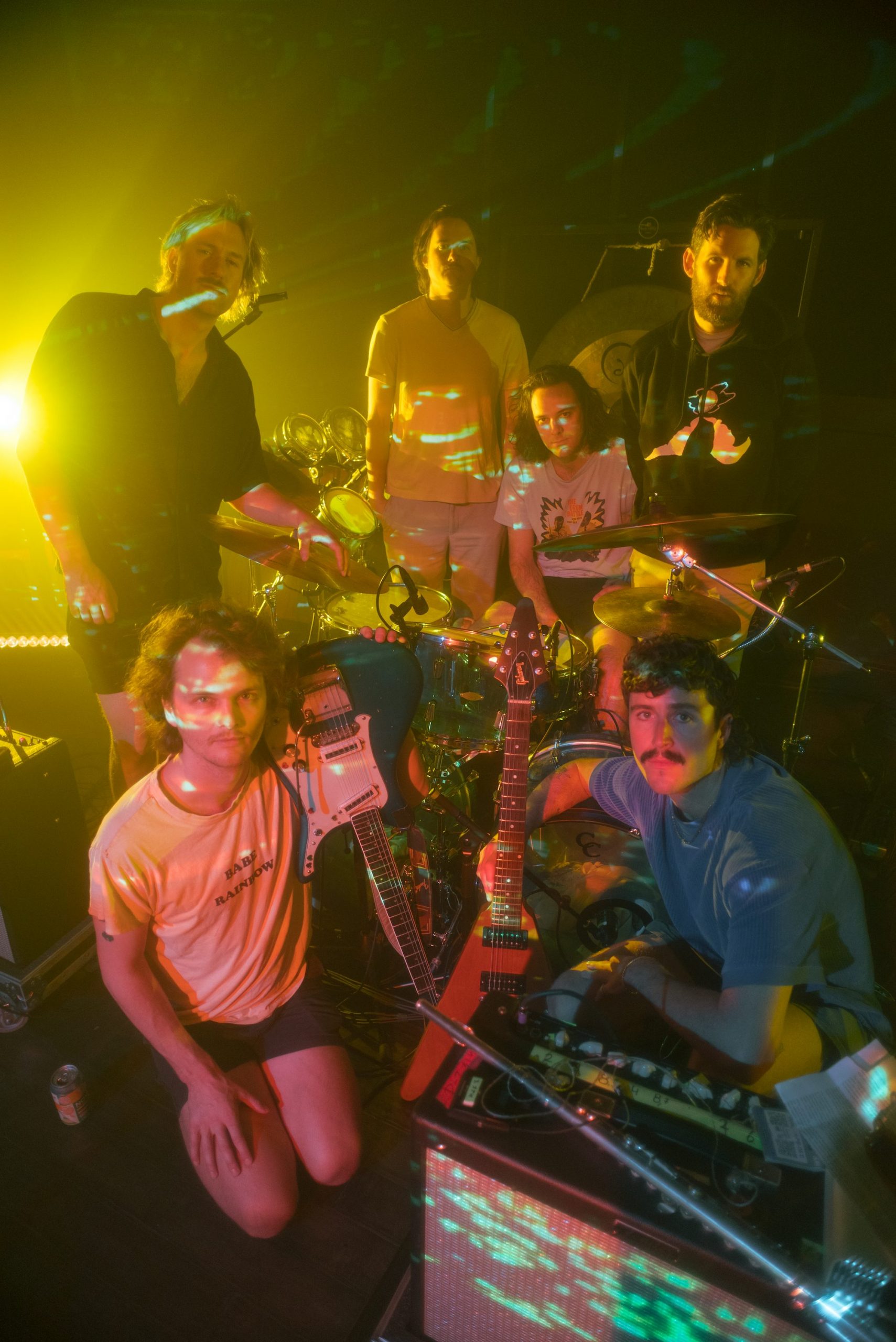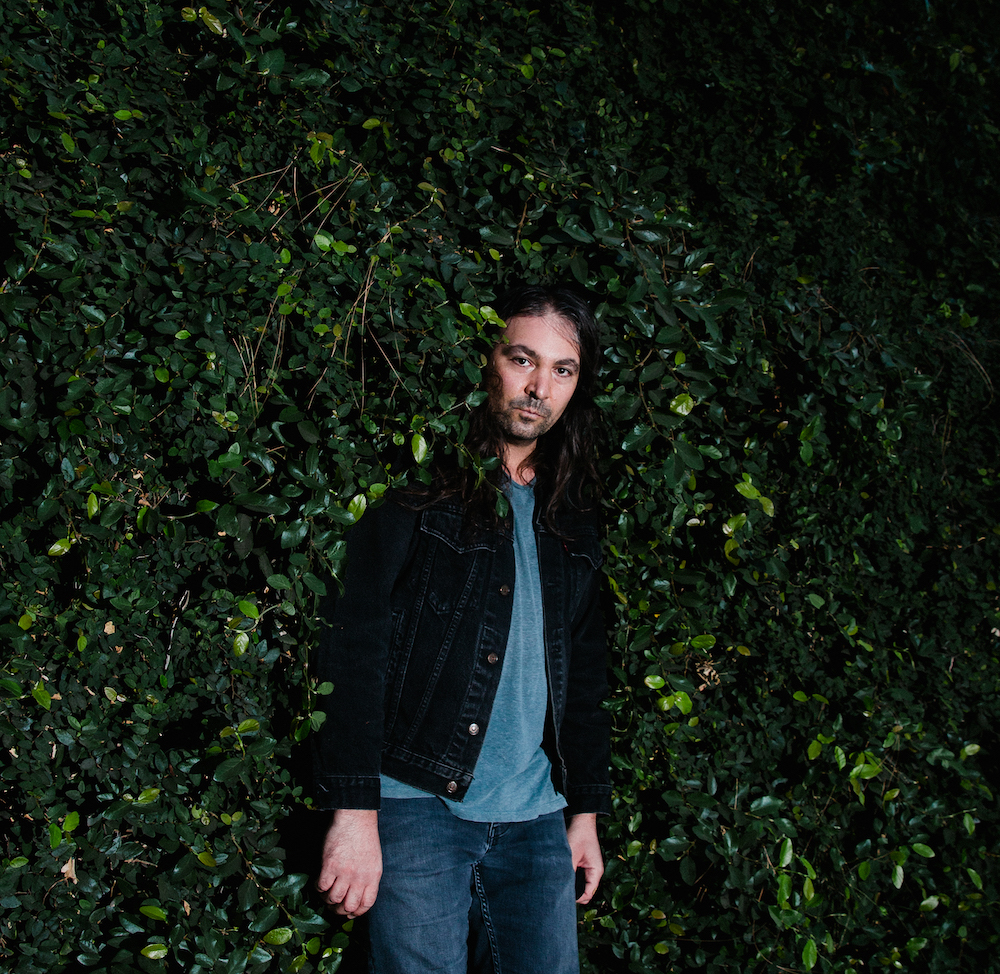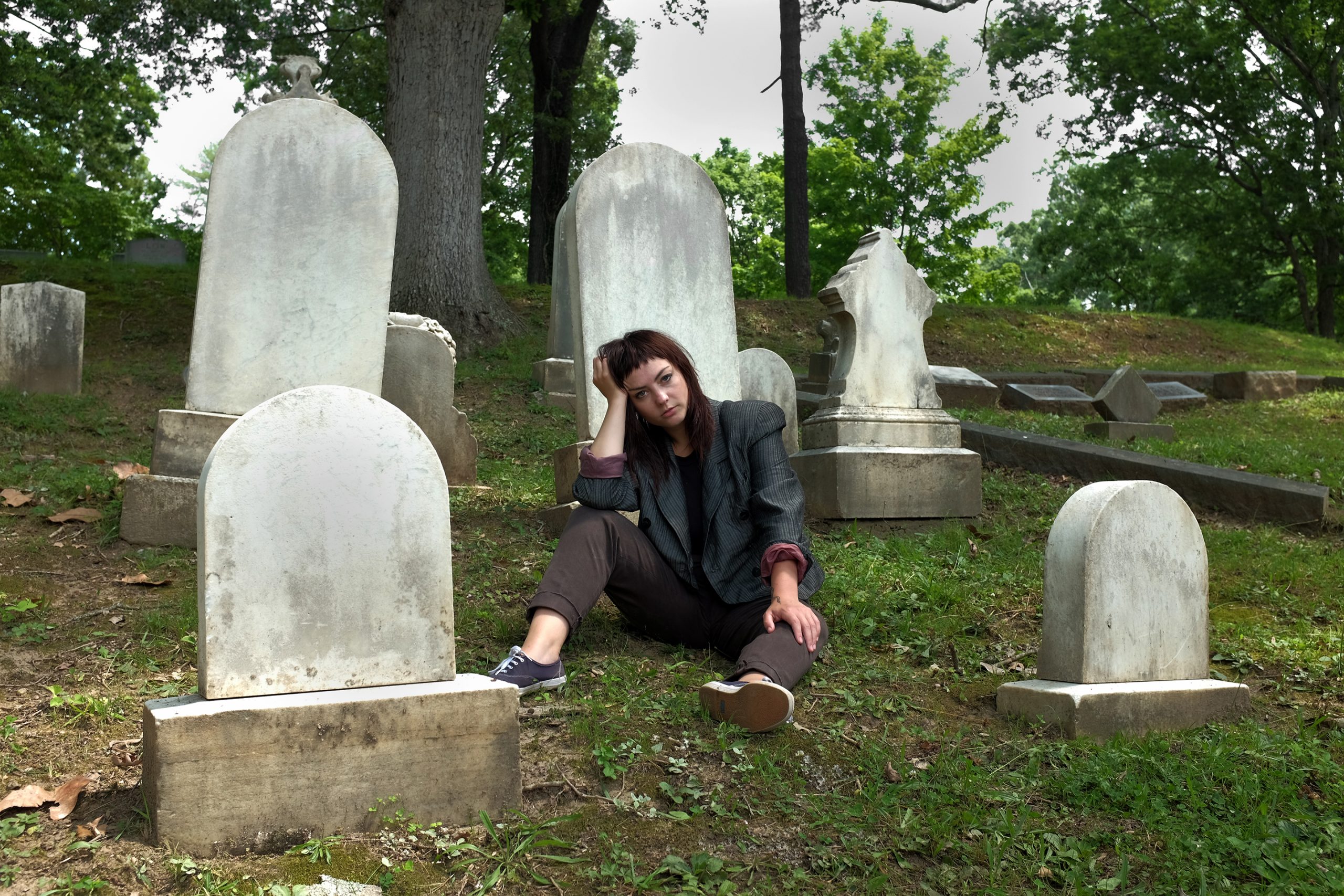In their first interview in years, the Vancouver rockers delve into their history, examine their "dudes rock" reputation, and explain why new album Fate & Alcohol marks the end of the band
Brian King will consider 2024 a success if Fate & Alcohol is the third-most important thing that happens to him this October. By then, the Japandroids frontman hopes to celebrate one year of sobriety, a milestone as hard-fought as you'd expect for a guy who wrote - and fully embodied - "The Nights Of Wine And Roses" and "Adrenaline Nightshift." And, as fate would have it, the due date for the fourth and final Japandroids album is the exact same as that of his first child.
These are standard talking points for a 41-year-old who has spent nearly half his life in a rock band. I imagine a glimpse into King's personal life would endear fans who might otherwise be skeptical about a Japandroids album with a song called "Upon Sober Reflection." But early sobriety and new fatherhood are special, fragile things of which anyone would be protective. Especially for someone like King, who is described by anyone who truly knows him with some variation of "intensely private." If alcohol and lust were the lifeblood of Japandroids, it only stands to reason that serenity would be the death of them. But if anyone cops a resentment over King's healthier, happier life, just know: You've been grieving a version of Japandroids that hasn't existed for over a decade. Fate & Alcohol is the stage of acceptance.
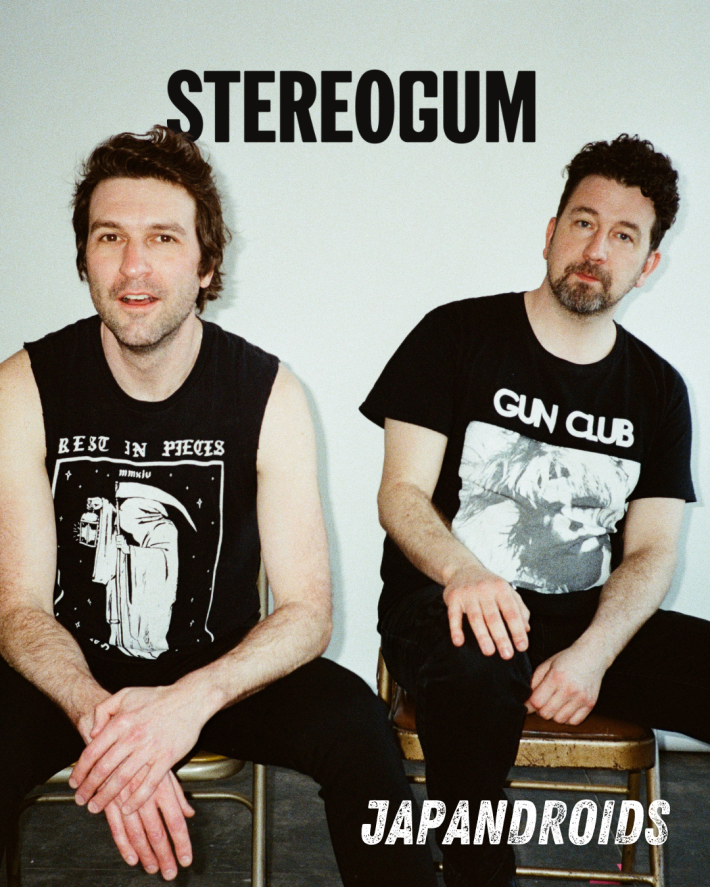
If it were totally up to King, I'd be discussing all of this with him and drummer/vocalist David Prowse in the same room. But besides being logistically difficult, getting the boys back in town might be technically illegal. In 2023, King's wife secured a faculty position at the University of Michigan and the couple moved to Ann Arbor. Lest this sound like a very un-Japandroids turn of events, their courtship loosely followed the plot of "Fire's Highway" - a northern soul (the Canadian-born King) in southern lands (specifically, Austin) found his way to southern hands, namely, an Oklahoman transplant who ended up joining the band on tour to run merch. They remained friends, and King went to visit her in Richmond in 2019 as she worked on her PhD at Virginia Commonwealth University. He planned to stay for a week. A few months later, they eloped.
King has taken a DIY approach to getting his green card, and the one thing he knows for certain is that he cannot leave the United States during the process or it starts all over again. There's an honest longing in his voice as he points out Windsor, a mere mile from where we stand on the Detroit RiverWalk. Prowse currently works a 9-5 as a booker at Rickshaw Theater in Vancouver, a venue that he estimates Japandroids played a half dozen times over the past 15 years. One could only long for a Japandroids record release show on the night of the Oct. 18 rather than Bowling For Soup. Prowse has yet to make it to Ann Arbor; they last met up in Los Angeles back in March, doing some last-minute studio work, taking meetings at the Anti- office, and conducting photo shoots. It's quite possible that the image on the cover of Fate & Alcohol marks the last time the two were together.
To make it clear: Japandroids have not broken up. But Japandroids are over. This semantic distinction probably won't satisfy hardcore fans who've read and reread every Fate & Alcohol press release holding out some hope that the duo will play a triumphant final tour, or even just a farewell record release show. The distinction between "broken up" and "over" is an important one nonetheless. Breakups, whether in a romantic relationship or a two-piece band, can be sudden and severe, but are nonetheless repairable. "It’s not like we got into a huge fight, screamed ‘fuck you’ at one another, stormed off, and now we’re broken up," King says. Old wounds heal, people mature, or maybe the money for one last 10-year anniversary tour is too good to turn down. If Oasis can do it, what's everyone else's excuse? Besides, how many rappers have explicitly announced their "retirement" album only to come back two years later?
"There was a brief moment where I think Brian had some second thoughts, and whether it was unfair to the album that we're not going to tour and properly promote it," Prowse admits. "We've had every conversation you could have, looked at every possibility, run every scenario," King explains, pointing out that any Japandroids show after six years would be closer to a reunion than a goodbye.
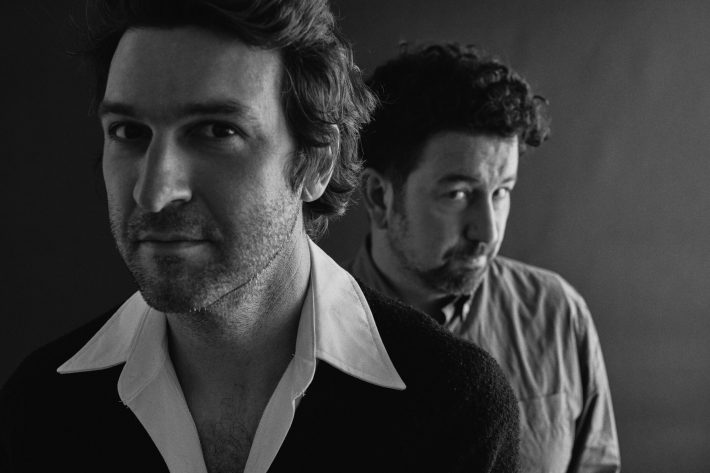
With that, Fate & Alcohol is a bittersweet proposition; King and Prowse have overcome seismic life changes, their paradoxical perfectionism, catastrophic breakups, and thousands of miles to finish one last record, and one that breaks the Japandroids mold by featuring ten songs instead of eight. Given how the band has explained its past albums as a necessary evil to get back on the road, it's amazing that Fate & Alcohol exists at all. But from the moment the gang vocals pop in on the opening "Eye Contact High," I start grinning like an idiot again, wishing Japandroids would come back to life for one last hurrah in an environment that's far friendlier than the one they faced in 2017 for Near To The Wild Heart Of Life. If any of that sounds relatable, you might feel similar to David Prowse. "I'd rather be playing drums and going all over the world playing shows, to be completely honest," he laments.
At this point, it dawns on me that the Japandroids album covers are unwittingly telling the story of the band in real time. From the fraternal embrace on Post-Nothing, they grow increasingly distant but still shoulder-to-shoulder. On the Fate & Alcohol shot, Prowse is slightly blurred and further in the background. Painful and possibly unintentional as this symbolism is, it's still hard to overlook. "I would like our relationship to be like brothers," he says. "But I have no idea what Brian's plan is, honestly. He's pretty private even with me."
King believes that there are two distinct eras of Japandroids. The first lasted from their formation in 2006 to the end of the Celebration Rock tour in 2013. The second will end on Oct. 18, 2024 with the release of Fate & Alcohol. There are several superficial dividing lines: There's the Polyvinyl Records era of Post-Nothing and Celebration Rock and the Anti- one of Near To The Wild Heart Of Life and Fate & Alcohol. The covers in the first era had the band name and album title prominently featured outside of a black and white square frame. The second era featured a stylized, serious photo of the duo and nothing else. But for King, there's a more obvious fault line: Vancouver and everything after.
The first iteration of Japandroids is exactly what you could imply from the Post-Nothing cover art: "We were living parallel lives, same city, same scene, same friends, listening the same music, going to the same shows and bars," King offers. Their 2009 debut was intended to document these misadventures and little beyond that, less expressions of Canadian civic pride than a plea for something, anything to happen. "We used to go out, get drunk, and get sad… this scene has gone bad," Prowse shouted on "Rockers East Vancouver," whose chorus betrayed the album's initial intention as a Japandroids retirement announcement: "We kept waiting but still nothing changes."
And then, in early 2009, everything did change. Hamilton-based music writer Stuart Berman had come across Japandroids a year earlier at a day party where he was performing with his band Two Koreas. Based on their name, he assumed Japandroids were "some synth-punk/blog-rock band," and when he saw them soundcheck, he amended his prediction to "minimal blues-punk act in the White Stripes/Blues Explosion vein." Japandroids opened with "Young Hearts Spark Fire," and Berman remembers thinking, "How is such a glorious, anthemic song coming from this scrappy little two-piece? There were maybe 10 people in the room, but they were playing like it was 10,000."
When Berman shared an early copy of Post-Nothing to Pitchfork's internal message board, I felt similarly about "Young Hearts Spark Fire." It sounded like hearing "Alex Chilton" for the first time and realizing that the Replacements could've been an arena-rock act if they truly wanted. Or the time I spun a promo CD of Bleed American in my car and got a speeding ticket by the time "Your House" came on. Or the first time my parents went away for the weekend after I bought a 50-watt amp and I could crank the volume knob past 2. Or just any night in high school where I somehow had access to more than two beers and thought, "It doesn't get any better than this." It's a song that evokes so many distinct, vivid moments of one's youth and still, you hear it and think, where has this been all my life?
Berman figured Japandroids would be a tough sell to his fellow critics in 2009, a year that would be dominated by finicky art-rock, day-glow synth-pop, shitgaze, and, soon, chillwave. Jesse Gander was also a fan before he became the engineer for all four Japandroids albums, but he was also skeptical about their crossover potential. "I remember thinking to myself upon hearing them, 'I really love the sound of this band, but I don't think they'll ever be popular in Vancouver.' People were still into synthy dance-punk kinda stuff in those days."
So they were surprised as anyone by the immediate enthusiasm that led to the very 2009, MySpace-to-mainstream trajectory: Best New Track, Best New Music, signing to Polyvinyl, touring with HEALTH and A Place To Bury Strangers. Though their first tour was postponed after King suffered a life-threatening gastric ulcer, the ensuing two years asked Japandroids if they were bluffing on "Young Hearts Spark Fire": Would they still be willing to live every night like it's their last even if they knew there was going to be a tomorrow?
Celebration Rock emphatically answered "yes," or, more accurately, OH YEAH, ALRIGHT. "Fire's Highway," "Adrenaline Nightshift," "Continuous Thunder," "The House That Heaven Built." The wanderlust of these songs wasn't hypothetical. After the tour ended in 2013, King decided to leave the band's native city and seek out new adventures in the bigger, wilder Toronto. "If I had to pinpoint a moment, we just were never the same again after that."
As King bounced between Toronto and Mexico City, Japandroids still wanted to make Japandroids Music the Japandroids Way, jamming together in the same room for hours until a decent idea came of it. But this now required plane tickets to places like Atlanta and Austin and New Orleans, studio time, equipment rentals and hard conversations. Songwriting had already been a painstaking process, even in their early days. King admitted in 2012 that it might take him six months to write a song that's good, which explained the three-year gap between Post-Nothing and Celebration Rock. In Japandroids 2.0, albums took five and seven years to complete.
The end of Japandroids is certainly a bummer from a strictly musical perspective, though it doesn't tell me anything I hadn't already assumed. After four years of total silence, Japandroids appeared on the poster for Atlanta's Shaky Knees festival in 2022, an anchor date in what was shaping up to be a short 10-year anniversary tour of Celebration Rock. When it quietly got canceled, I figured they were done for good. Which turned out to be only somewhat correct. "At first, [Brian] was like, 'I don't know about this tour, we're still in the middle of making this record," Prowse recalls. "And then that conversation kind of quickly evolved into, 'I don't know if I ever want to tour again.'"
I'd grown accustomed to 2017's Near To The Wild Heart Of Life being the band's final statement - a valiant, often thrilling, and ultimately divisive attempt to answer the question of whether Japandroids were put on this earth solely to make an album called Celebration Rock. The album's penultimate song repeats "No known drink and no known drug could ever hold a candle to your love," King calling his shot on marriage and sobriety seven years ahead of its time. "In A Body Like A Grave" works perfectly as their "True Love Waits" or "End Of Reel," a closing power ballad that plays like a last will and testament ("And age is a traitor, bit by bit/ Less lust for life, more talking shit").
But even if Japandroids had quietly disappeared after Near To The Wild Heart Of Life and never released another second of new music, they would endure as an undying avatar of male friendship. Especially in the last decade, plenty of artists have proposed that masculinity needs to be torn up root and branch and, failing that, most dudes had just come to accept that sitting around and remembering various athletes from the 1990s was as good as we could do. But alongside this trend has been the rise of "dudes rock." Not necessarily "rock for dudes," or "rock made by dudes," though that's a big part of it. Rather, it embodies what Prowse describes as a self-aware and self-deprecating "non-toxic masculinity," where the pursuit of cold beer, hot girls, and loud rock are a higher calling — and like any spirituality, it can only be tainted by those who take the scripture in vain. Homer Simpson once tried to teach his son a lesson by comparing women to a beer - they smell good, they look good, and you'd step over your own mother just to get one. These are basically the lyrics to "Wet Hair."
Even amongst the likes of the Menzingers, the Gaslight Anthem, and the Hold Steady, or even the bro-country and hip-hop where male camaraderie is loudly celebrated, there's something pure, almost twee about what Japandroids represent as a two-piece: a best friend, something most kids have in grade school and slowly age out of in favor of cliques and crews where vulnerability can be distributed more reasonably. "In my first few years of knowing the band, I almost thought of Japandroids as one person," Berman shares. "They even shared the same cellphone and email back in the day." This is powerful stuff: Maybe boygenius would be just as popular if their intraband dynamic was more like Fleetwood Mac, but by performing such intense and uncomplicated friendship as adults, they became something truly aspirational rather than just admirable.
Just about everyone who's ever been in a band will tell you it's closer to a marriage than a friendship or even a business. This is even more true when your band is just two people. Both Prowse and King use the word "dysfunctional" to describe their relationship throughout the duration of Japandroids, and it did not burn with a legendary fire at the beginning. They met through a mutual friend at the University of Victoria, and Prowse reveals that they didn't immediately hit it off. "I actually thought Brian was pretty annoying," he laughs. Still, the duo became part of a larger U of Vic crew that was going to local shows and eventually, moving to the big city three hours north.
Prowse wasn't much of a drummer at the time, more a guy who wanted to be in a band and determined at 19 that playing drums was the best way to accomplish that. When he was listening to Guns N' Roses as a kid, King dreamed of being Slash rather than Axl - a guy who looked cool, played cool riffs, and maybe had ambitions to form a blues side project somewhere down the road.While King and Prowse dabbled in other projects, "I think we just kind of picked up that we were both by far the most dedicated, ambitious and hungry of our friends," Prowse says. "Japandroids was the first band I played in where I was really excited about the music versus playing in a band with my friends."
Both could agree that neither wanted to be a frontperson and that they didn't want to be GN'R. As with most 20-somethings in a thriving indie scene during the early 2000s, they wanted to be the Yeah Yeah Yeahs. Most of their early material started as instrumentals waiting for a Karen O, and in a fascinating piece of Vancouver indie rock lore, an early version of Japandroids was fronted by Cailyn Murray - then wife of Hot Hot Heat frontman Steve Bays. King describes it as a kind of math-rock made by musicians who couldn't really add: the song structures didn't make sense, the pockets of dead air were eventually filled with gang vocals from guys who didn't know how to sing and didn't really want to learn at that point. You can hear the results on the All Lies and Lullaby Death Jams EPs, which were eventually bundled into No Singles in 2010.
Everything since then is the result of Japandroids learning how to write songs in real time — and also, learning everything else about being a band on the fly. This is only the second time I've met King in person; the first occurred in 2009, about two months after the release of Post-Nothing. They were doing a one-off opening gig for Future Of The Left, the post-Mclusky project of Japandroids hero Andy Falkous (until the very end, King and Prowse kept playing their "To Hell With Good Intentions" cover). They were friendly, drunk but coherent, manning their own merch booth. "We couldn’t just be fucked up all the time," King explains. "At least one person had to stay sober in order to drive and make sure we got paid."
The success of Celebration Rock meant that they could pay other people to do all of that. Someone else could drive, someone else could load in and out, someone else could drink with King or Prowse if they were pissed at each other. "It allows a somewhat dysfunctional relationship to persist longer, because you have a bit of a release valve, right?" Prowse notes. "If Brian's driving me crazy, I go out with Bob the lighting guy and rip it up. Maybe Brian would go somewhere after the show with Eric the tech."
The way King tells it, this was happening a lot. "We started the Celebration Rock tour as a band and crew, but over time morphed into a more of a motorcycle gang," King says. "We were drinking heavily and dedicated to squeezing every last drop of adventure out of every day. Not quite ’70s rock excess, but about as close to the rock and roll lifestyle as an indie band could live at that time. By the end, we were basically just pirates."
That excess carried over to the creation of what would become Near To The Wild Heart Of Life. Again speaking without hyperbole, King states, "I truly believed that we were going to make our Born To Run or our OK Computer." I ran into their publicist in 2016, and she showed me a text from King, informing her to tell me that Japandroids were well on their way to making their White Pony. I thought it was a joke, an artist pandering to my well-established tastes. King proudly claims he's seen Deftones about 30 times across several continents; opinions on their artistic merit remain a wedge issue for the duo. Still, you can see where King's head was at after firmly establishing the Japandroids identity over two albums subject to universal critical acclaim and upwards of 600 shows. Japandroids needed their pantheon-level third album, one that took everything they already did well and blew it up to widescreen proportions. "In retrospect, it was more akin to Be Here Now."
On a literal level, the seven minute arena-synth epic "Arc Of Bar" really does sound like something Oasis would've made in 1997. But for King, the similarities are more spiritual, less flattering. "They were at the height of their fame, with an infinite budget, but blinded by alcohol and drugs. Song-wise, they believed they could do no wrong, and when it came to sound, more was more.” he muses. "We had the same attitude, minus the fame and fortune." King and Prowse made protracted efforts to change their approach: Rather than subjecting each song to grueling R&D on the road, they trusted their ability to tinker with sketches brought into the studio. The duo strove to truly nail each part rather than settling for the "vibe" and "feel" that came with the flubbed notes on previous records. But whereas their role models worked in upgraded facilities and hired outside producers and learned new studio techniques, Japandroids tried to make Near To The Wild Heart Of Life the exact same way as they did Post-Nothing and Celebration Rock, recording with Gander in Vancouver.
If Japandroids' aim was to make a record that broadened their sound without losing their essence, Near To The Wild Heart Of Life was an undeniable success. "Arc Of Bar" and "I'm Sorry (For Not Finding You Sooner)" imagined a future of bionic, booming electro-rock; after spending Japandroids 1.0 stringing together stray lines, King could script fiction and memoir. "Synths! Ballads! Acoustic Guitars! Welcome to Japandroids 2.0," Pitchfork trumpeted in 2016.
And yet, upon hearing the final product with Gander, "There wasn't a sense of triumph that we were expecting to feel. There was just a sense of like, huh." As Prowse shared on the Polyvinyl Podcast in 2022, they had a similar reaction to Celebration Rock. But the stakes and expectations were much higher this time around, and feeling they'd exhausted their capacity, Japandroids did the Pantheon-Level Third Album thing: They made a last ditch effort to bring in a hotshot producer.
"Our fans have this image of us at the top of the ‘dudes rock’ pyramid... that at any given moment Dave and I are out there somewhere dudes-rocking together."
BRIAN KING
Theo Wargo/Getty Images
They compiled a wishlist and eventually made the call to Peter Katis after hearing his remix of "North East South West." "Hiring Peter seemed like a sure bet. He'd helped make Turn On The Bright Lights and Boxer, and we wanted to make a record of that calibre," King says. "But it's not that simple. If you could buy greatness, every record would be great."
As much as he loved the albums Katis produced, King astutely points out that the National songs are mixed almost like hip-hop, where the drums and vocals stay high in the mix no matter the volume. He suspected the partnership was a mismatch when he played the Stooges' "Search And Destroy" for Katis. "He'd never heard it before and his response was, ‘This sounds fucking awful, you want to sound like this?'" There were now essentially two versions of Near To The Wild Heart Of Life, the one completed with Gander and the Katis remix. Japandroids struggled with choosing between one or the other, or cobbling together a mix-and-match between the two. If they didn't have a tour booked, they might have tried to re-record the entire thing. They settled on the Katis version and, thinking back on his rationale at the time, King shrugs, "Peter is extremely talented, and considerably more knowledgeable and experienced in their studio than we were. He’d made several classic records, so his opinion carried a lot of weight with us. When it came time to make decisions, I trusted him more than I trusted myself to make the right call."
I don't think King's desultory take is necessarily the correct one. Yes, the reviews lacked the ecstatic praise that met Celebration Rock, but they were largely positive, and Near To The Wild Heart Of Life made a handful of year-end lists. If they made any mistake, it was failing to engage in some kind of international election fraud after the release of the title track on Halloween 2016. "Has a great record ever been so out-of-step with its cultural moment?" Tom Breihan asked in Stereogum's Premature Evaluation, acknowledging that writers were already sick of viewing everything through the prism of the Trump presidency that had barely started by the release of Near To The Wild Heart Of Life on Jan. 27. "I poured my heart and soul into those songs. To live them, write them, rehearse them, record them, mix them, master them, it's years of work. The fact that they were even mentioned in the same breath as Donald Trump was so fucking insulting. Like, you listened to my record and that was your takeaway?" King spits, seven years of frustration rising to the fore. "I was furious and wanted to fight him. Still do." (In Breihan's defense, the final paragraph acknowledges, "This isn't Japandroids' fault. They aren't even American, for fuck's sake").
But by most metrics, Near To The Wild Heart Of Life was still a success; the shows were bigger, their songs made inroads on satellite radio stations, and more importantly, the demographics underwent a noticeable shift. "We started noticing more women at the shows," King smirks. "The Near To The Wild Heart Of Life tour started off our standard 80-20, then 70-30, then 60-40, and by the end it was 50-50." I can confirm that Japandroids shows in 2017 were starting to resemble Date Nights, a fitting circumstance for an album where their girlfriends did backup vocals.
But when a newer song inevitably got followed by "Young Hearts Spark Fire" or "Fire's Highway," the dudes rock contingent was back in full force, a reiteration of what made the Japandroids live experience essential, even if the band themselves were often exhausted by their tortuous drinking and touring regimen. The difference between the two was, ironically, best demonstrated by the 2020 live album Massey Fucking Hall, which often felt like a Michelin star restaurant passing out scratch-n-sniff stickers to people who couldn't book a reservation. "The fans party hard and go home to their beds. They're hungover the next day and the day after that life returns to normal," King laments. "Whereas we’re in an endless party loop, giving the same experience to different fans in a different city, night after night after night."
In the absence of any kind of social media presence, it's understandable that most Japandroids fans would assume that the nights of wine and roses extended to their days as well. Prowse recalls how he would flinch whenever journalists would describe Celebration Rock as "the sound of being six beers in," while also acknowledging the very first lyric on the album is "Long lit up tonight, and still drinking." "Our fans have this image of us at the top of the 'dudes rock' pyramid. Escapism has always been a big part of our appeal and I think they take comfort in the idea that at any given moment Dave and I are out there somewhere dudes-rocking together," King expounds. "Whereas in reality, we live in different countries, thousands of miles apart, and rarely see each other. There was definitely a long stretch of our lives where we were daily dudes-rockers, but those days are behind us."
Both King and Prowse bring up Guided By Voices as a counterpoint for their own reputation. Maybe it's just a matter of longevity, but King feels that Japandroids never created the expectation that they would be shitfaced throughout the gig. I doubt there would ever be a market for an entire CD of Brian King stage banter. Conversely, Prowse can see Robert Pollard as a kind of aspirational figure, someone who has spent nearly 40 years being the exact guy that people think he is onstage and off. He also admits that's an easier view to take as the drummer of Japandroids, rather than the frontman and primary songwriter. But what happens if your livelihood is contingent on playing the role of someone who's slowly killing you?
King prefaces that I should expect "Brian, formerly of Japandroids" when we meet, rather than "Brian from Japandroids." Despite having dedicated thousands of words and hundreds of hours to Japandroids music over the past 15 years, forgetting everything I think I know about Brian King is shockingly easy - I barely know anything about the guy.
This aspect of Japandroids distinguishes them within a genre that they certainly defined even if they didn't invent it. Call it "celebration rock" or "dudes rock," but you know it when you hear it - the classic rock tropes and punk rock ethics (or vice versa), the booze, the lovable losers, and, most importantly, it's made by dudes (not necessarily men, though I'm uncertain whether any female-fronted band has ever been compared to Japandroids). King and Prowse have toured with nearly all of these bands — for example, the Gaslight Anthem, commemorated on Prowse's sole vocal contribution to Fate & Alcohol, hilariously entitled "A Gaslight Anthem." If someone wants to get a sense of whether the people in Gaslight Anthem could double as the people in Gaslight Anthem songs or the people who'd be listening to Gaslight Anthem if they weren't in the band, Brian Fallon and Benny Horowitz would probably go on your podcast and tell you all about it.
When I first meet King at an upscale coffee shop in the ever-gentrifying Detroit neighborhood of Corktown, he doesn't appear all that different from his on-stage look - black T-shirt, black jeans. Except now, he's wearing black Onitsuka Tiger Mexico 66 sneakers and a black '47 Toronto Raptors hat. He drives a GMC Acadia with a case of Topo Chico in the trunk. Whatever his reservations about fatherhood he certainly looks the part of a 41-year old dad. Or an NBA podcaster. In other words, he looks like a stereotypical Japandroids fan. "I've spent most of my life keeping a healthy distance from children and I have virtually no experience with babies," King says. "But the closer it gets, the more excited I am. I’m starting to think it’s the role I was born to play."
This would be welcome news for anyone who'd heard whispers about Japandroids being a standoffish, or even prickly band in person. "I was frequently fucked up," King explains. "Alcohol, ego, the caricature of a rock star. Looking back, it was sordid and silly, though I wasn’t looking back in those days."
Berman speculates that King keeps the press at arm's length because "rock 'n' roll is something that's very sacred" to him, and that playing the game puts Japandroids at risk "to become another band chewed up and spit out by the hype machine." He notes how Japandroids have aligned themselves with iconoclasts rather than the bands to which they're most often compared. They've covered Nick Cave, Gun Club, and Mclusky rather than, say, the Replacements. They signed with Anti- in part because it was a label created for Tom Waits.
Stereogum relies on reader subscriptions to deliver articles like the one you're reading. Become a VIP to view the site with no ads, get Discord access, read members-only features, and more.
Still, for most of their career, Japandroids faced little hostility, which ultimately made its rare appearance more memorable to King. "All the old adages are true. I rarely think about the good shows, but I’m still haunted by the bad ones. I wish I could do an entire tour of redos." Which gets to why King might have decided to do his first interview in four years to begin with. Japandroids did an extensive 2012 Pitchfork profile that has served as an ur-text for the band; King and Prowse were remarkably candid and insightful about their strengths and limitations, describing themselves as not "creative" people but rather "people who love the people who are born with that special thing so much that they want to try their best to get as close as they can to it."
King was writing about the same things he did on Post-Nothing - the lure of the road, the lure of the next drink, being at once awestruck and terrified by the prospect of romance - but he was tapping into the mythical, heaven-and-hell dichotomies of the blues and the '70s arena rock that it spawned. While he's not singing about orcs or Mordor or killer robots, the stakes set by Celebration Rock are so extreme that it's impossible to imagine "Fire's Highway" or "Adrenaline Nightshift" happening to anybody, let alone King. "The Case Against Japandroids," made in a 2012 Vol. 1 Brooklyn essay, rested on the belief that they weren't as authentic as Titus Andronicus.
And so combined with another statement about his process - "we actually tried to simulate the sound of what we thought the crowd would do during the songs" - this evolved into a grave misreading that King was pulling his lyrics from the ether rather than personal experience. And in seeing writers use my interpretation as a primary source, King has been carrying a justified grudge for over a decade. "To be clear, the songs are in fact very personal. They are about real people, real experiences, and I hold them very dear," he says. "Fire's Highway," that's about real people. "The House That Heaven Built," also about real people. "Singing them with the conviction they deserve means traveling back in time and reliving those little chunks of life in my mind, which is why I close my eyes when I sing. There might be a thousand people right in front of me screaming along to every word, but when I’m conjuring up one of these memories I might as well be on a different planet." He apologizes for what he considers rambling, turning his attention to a sandwich that had been flanked by buzzing bees for the past 10 minutes.
Prowse has witnessed this kind of obsessional thinking many times during the past two decades. "Brian has that kind of brain where just like everything is meticulously organized," he notes. "He's just the kind of guy where if you take one book off his bookshelf and you put it somewhere else he's gonna notice." Ironic, then, that King asks that we stop at John K. King Rare & Used Books (no relation) for an icebreaker. We're already running behind schedule because King misjudged the time it would take for him to stop at a different used book sale in Ann Arbor. A large banner proudly boasts of John K. King being named the "#2 book store in the world" by Business Insider, and King arrives with a typed wishlist that is virtually useless against the confounding arrangement of over one million books.
When we get to the music section, there's at least three copies of different Amy Grant books, and King expresses audible disappointment that it somehow lacks Shakey, Jimmy McDonough's sprawling (if not entirely authoritative) biography of Neil Young. It's his favorite rock book of all time, and Japandroids chose to record their live album at Toronto's Massey Hall as tribute to Neil Young's 1971 release of the same name. King's idolatry is understandable, even if he hasn't taken a lot of lessons from Young's prolificacy. While every Japandroids album aspires to capture the transformation power of rock 'n roll, every one of them has been a colossal pain in the ass.
King and Prowse loved writing music together. They loved touring even more. And to make sure that the first leads to the second, they had to do the one thing they hated about Japandroids more than anything else: sit in a studio and play the same song a hundred times until King thinks they got it right. "We're supposed to sound sloppy and spontaneous, but Brian, he gets so fixated on things - 'I don't know what's wrong, but something's wrong, and we've got to figure out what it is,'" Prowse explains. "There's an element of me just being like, 'Brian, you need to let this go. This sounds great.'" As much as Gander gets frustrated by the process, he has trouble recalling a time when he didn't agree with King that one last take would knock it out of the park. "I have a lot of respect for Brian's perseverance and I think it comes across in his music."
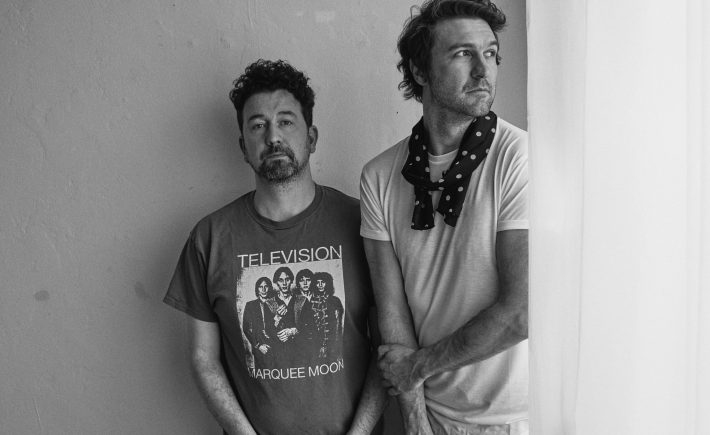

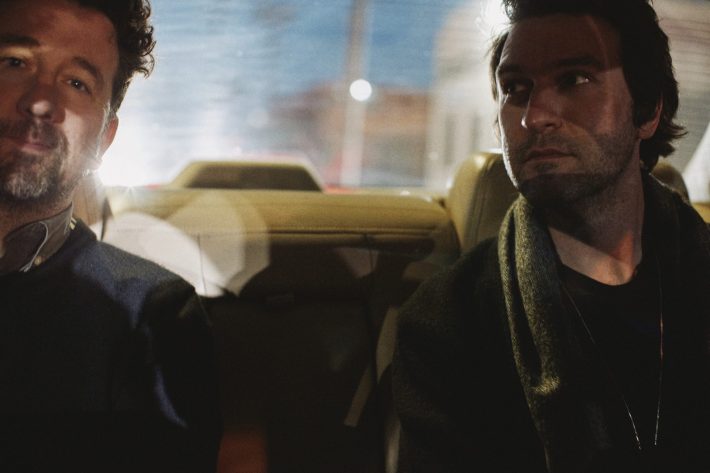
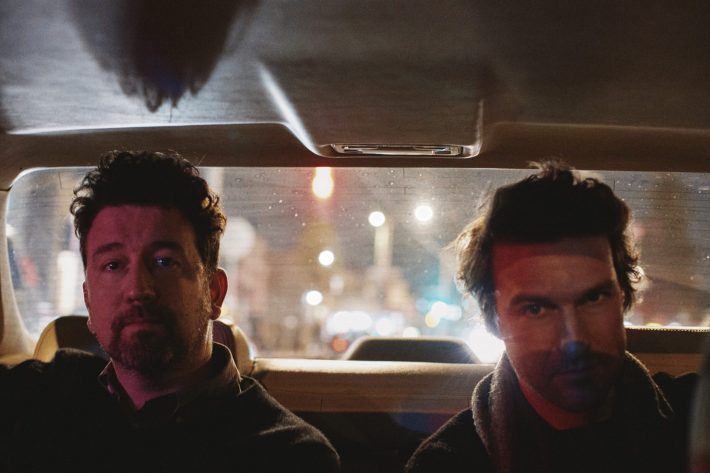
Yet, neither King nor Prowse can remember a Japandroids album that was completed strictly on their own terms. They're done when they run out of money and have a massive tour booked to replenish said funds. It's quite possible that Celebration Rock might have been released in 2014 or possibly even never if the duo weren't contractually obligated; Prowse admits they spent three years plagued with a fear that they'd never top Post-Nothing. Even then, most of the lore surrounding Celebration Rock centers around how much they doubted their most popular songs.
Here's King's reaction after hearing the recorded version of "The House That Heaven Built" for the first time: "It made me squirm. I just can’t hit that note, though changing it would totally fuck up my flagship melody." When King had finished writing "Fire's Highway," he had correctly assumed that he had perfected his craft. "I have done it, I have written The Song," he jokes, noting that he'd manage to cram everything great about specific Post-Nothing tracks - stop-start breakdowns, a big hooky chorus, a shrieking guitar solo - into five minutes. And it completely bombed when they first started playing it live. "I came away from that tour thinking I had totally misunderstood our appeal and grossly overestimated my talents as a songwriter. I thought 'Fire’s Highway' was a banger, the best thing we’d ever done, but the tepid response had me second-guessing myself and the way I constructed songs. To me, there is an obvious difference between the songs written before that tour and the songs written after."
King's beliefs would eventually be vindicated, though doubts persisted until the very last minute. Japandroids got "The House That Heaven Built" and "Continuous Thunder" from a last-ditch writing session in Nashville, and even then, they were left with only six songs. Which is why Celebration Rock contains their 2010 single "Younger Us" and "For The Love Of Ivy," taken from a stash of covers they recorded as B-sides. If you've listened to Celebration Rock as much as I have, it's easy to clock the small but significant difference in guitar tone on just those two songs; though Gander understands King's frustrations: "When everyone loves your record, it makes it a hell of a lot easier to accept the things you personally don’t like about it."
Though King says that many of its songs have roots in the Near To The Wild Heart Of Life sessions, I'd argue that Fate & Alcohol occupies its own space within Japandroids 2.0. Maybe Japandroids 2.5. Fate & Alcohol will drop almost exactly six years to the day after the final Japandroids show at the Phoenix Concert Theatre in Toronto. King had grown accustomed to the thrill of leaving everything you have on the stage at the last show and the post-partum depression of an album cycle coming to a close, assessing where the band is at mentally, physically, and creatively. Only this time, he couldn't shake the nagging sense that something bigger was in the process of being completed. He doesn't think that show had the best setlist or the craziest crowd. Yet, even though the band's manager had seen them play countless times in Toronto, he told King, "That's how I wish you'd always play."
"I’m very proud of that one," King says. "We’d been touring for two years and I was in rough shape, drinking heavily to get through each day. But it was the very last show and I gave it everything I had. Obviously I didn’t know it would be our final show ever, but the fact that we finished the tour on a high note definitely made it easier to walk away. Had it been a bad show, or even mediocre one, there almost certainly would have been more. So many bands end in a fight or an overdose, but we went out guns blazing in Toronto."
Though both King and Prowse were ambivalent about the process of starting on LP4, the task appeared to be less herculean than in the past. King estimates they wrote 25-30 songs between 2017 and 2020, and several of them were beginning to become fixtures in their setlist. From that batch, "D&T" and "Alice" made the final cut, the latter growing from what Prowse describes as a "total Gun Club ripoff" to its more robust final version.
I'd been hearing from the Japandroids camp that they were thinking about being more flexible with their release strategy going forward, that they might be open to releasing singles or EP as they did prior to Celebration Rock. King did indeed envision Fate & Alcohol as a reaction to the more experimental Near To The Wild Heart Of Life, an attempt to capture lightning in a bottle in the Japandroids 1.0 style: "Are they fun to play? Do they have exciting moments for the stage? Do they have that potential call and response factor with the audience?" And so, we have the irony of Fate & Alcohol being conceived as an album meant to be experienced live.
Perhaps we'd already be celebrating the fifth anniversary of Fate & Alcohol if its only goal was to evoke the sound of Post-Nothing. But as King struggled with drinking, his relationship with Prowse and his own muse, Japandroids' music was no longer compatible with his current experience or what he hoped to become as an artist or just a human being. In the parlance of recovery, drinking evolves from "fun" to "fun with problems" and then just "problems." In King's view, Fate & Alcohol couldn't possibly exist if Japandroids continued to occupy only the first part. Throughout the extensive and exhaustive songwriting process, King became less interested in the legendary fire, more in the mundane friction that leads to the initial spark. When he first moved to Toronto, he stayed with a longtime friend named Anthony who served in the executive producer/wingman role that most people imagined for Prowse. "Because we lived together for so long, he came to view his feedback and guidance as an integral part of my songwriting process," King says. "He was fascinated by my pivot to what he called situation songs and was determined to help bring 'Situation Rock' to life. If we were out and about, he loved to ask me if this was a situation. If I said no, he would immediately ask whether or not I wanted him to make a situation. The answer was always a terse please don’t. It was a running gag between us."
Lead single "Chicago" is the first Japandroids song to consider a morning after, the pungent scent of a greasy spoon diner mixing with alcohol sweats and the hair of the dog. Whatever happened the night before does not appear to have been worth it at all. King is particularly proud of "Upon Sober Reflection," a dialogue where he takes the unprecedented tack of writing from the other person's side of the story. Even as he struggles to reconcile his conflicted feelings towards Fate & Alcohol as a Viking funeral of a record, Prowse considers "Positively 34th Street," an expectedly Dylan-esque metahistory, "the best lyrics he's ever written, bar none." As long as bands make music about hard drinking, hard touring, and hard loving, mundane hangovers and heartache will be fair game as subject matter. Still, King describes all of this as "uncharted territory" for Japandroids. It might just be the whole map for King's future.
Unlike with past Japandroids records, the finished product represents "a fraction" of King's writing over the past four or so years. "Part of my sobriety plan was to try to write a song per month, which meant I’d have a whole record by the time I hit the one-year mark," he explains. "The first two months were extremely difficult, both mentally and physically, so I didn’t start writing in earnest until month three. But once I got going, I quickly caught fire. It helped give my days structure and purpose. At 10 months, I have 14 new songs and counting." The new music takes inventory of his actions and consequences and also whether a career in music is something to which he can or should fully commit. The process of completing Fate & Alcohol took an incredible toll on King's physical and mental well-being; beyond the breakups and hangovers and arguments with Prowse, the darkest moment for King came after Anthony passed away after a short, but brutal struggle with cancer in 2023.
Knowing what I do about King's songwriting process and the impact of reliving these situations 300 times over the span of two years, asking for anything beyond the existence of Fate & Alcohol feels horribly selfish. "I hate that my only contribution to music thus far has been murky and I would really love to make at least one record with a clear head," King says. "But I worry about falling back into old habits. Once was enough, I can’t put my family through that again."
King now sees artists like Jason Isbell and labelmate Katie Crutchfield as role models, ones who had accumulated a sterling track record prior to sobriety and reached even greater artistic heights afterwards. If Fate & Alcohol is any indication, perhaps the next phase might sound like solo Paul Westerberg. Either way, King plans to figure it out one day at a time. "My dream is to return as a new and improved version of myself, to take everything I’ve been through and make some meaningful music out of it. I’ve watched other artists do it, so I know it can be done," he says. "But until then, I plan to stay the course, focus on my health and my family." Japandroids aren't Brian King's to die for anymore. So he must live.
Fate & Alcohol is out 10/18 on Anti-.
